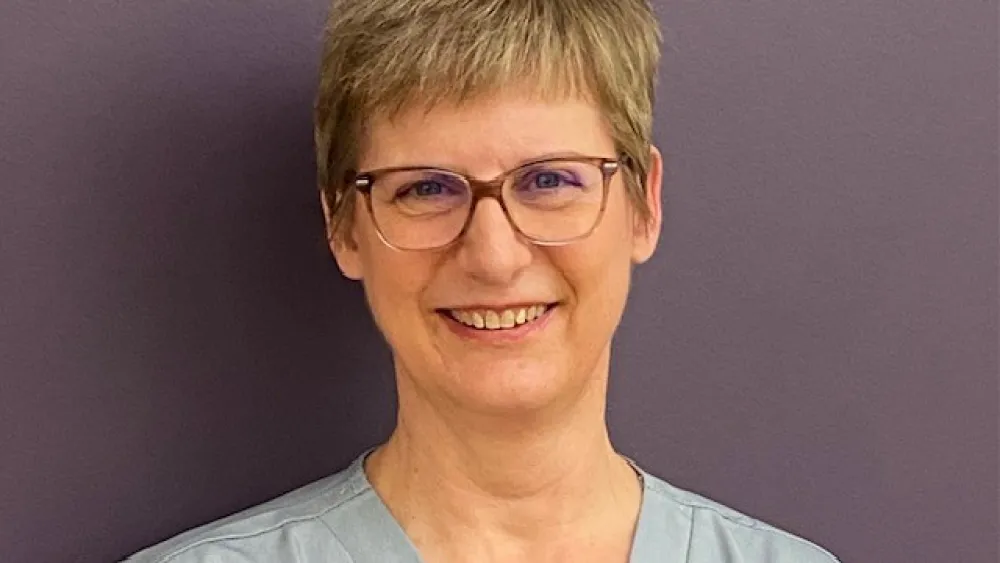Our People
The Core of What We Do: Blood Bank Technical Coordinator Nancy Strong Uses Her Strengths in the Lab to Enhance Patient Care
Published: Jan. 12, 2024

In “The Core of What We Do,” you’ll learn more about Methodist’s core service lines – primary care, oncology, cardiology, women’s health and orthopedics/surgical services – and the people whose dedication makes them so impactful for our communities. To explore career opportunities at Methodist, visit bestcare.org/jobs.
Nancy Strong, MS, MT(ASCP) BBCM
Technical Coordinator
Methodist Pathology Center-Schenken Pavilion
Why is Surgical Services so important? How does it contribute to The Meaning of Care?
Surgical Services is a main Methodist service line that a large number of patients need. Many of the surgical procedures are complex, and patients can be at risk for blood loss. Surgery is also heavily involved when emergency cases arise or patients are transferred from other campuses. The Methodist Blood Bank and Surgical Services work closely together to ensure that necessary blood and blood products are available for scheduled (routine) and emergent cases. Communication is vital between Surgical Services and the Blood Bank so the blood inventory can be managed and products are ready when the need arises.
What’s something people should know about Surgical Services?
While people may initially think of a surgeon as the main role in Surgical Services, there’s a large behind-the-scenes team making sure patient needs are met. From support staff, runners and nurses in the operating room to the medical laboratory scientists and pathologists in the lab, it takes all of us interacting and communicating to make processes run smoothly and efficiently.
Tell us more about your role at Methodist.
In my coordinator role, I’m responsible for the Blood Bank’s day-to-day operations. I have a co-technical coordinator whom I work closely with to manage all of the details of the department. The workday is full with training staff, writing procedures and making sure we’re always ready for an inspection!
What do you enjoy most about your role?
I enjoy being able to help patients but not having to be at the bedside. I’m still contributing to the care of that patient, but I’m in a position where I can use my strengths.
Are there any memorable moments from your work that stick out?
There have been several events where we supported a patient with 30, 40 or 50-plus units of blood and blood products (also known as a massive transfusion). Those are memorable, but more recently we had a patient present to the Emergency Department with anemia. A tech in the Blood Bank noticed the sample drawn from the patient didn’t look quite right and started additional testing. It was determined that the patient was having a delayed transfusion reaction. This workup happened on the overnight shift, and we were able to provide the patient’s health care team with this new information in the morning. The patient didn’t initially fit the clinical picture of someone having a reaction, but by paying attention to details and “listening to your gut” when something didn’t seem right, the Blood Bank helped the patient receive the care they needed for this condition and saved many hours of unnecessary testing.
Why Methodist? Why have you stayed?
I left laboratory management to come to Methodist. While my experiences in management were very valuable, the most important thing they taught me was my strength in technical skill. I do my best work at the bench. I’ve stayed because I thoroughly enjoy my coworkers and the culture of the lab and Methodist as a whole. I feel very supported and valued as an employee!
What does The Meaning of Care mean to you?
It’s a way of life. It’s a way of modeling Methodist’s core values so everyone I come in contact with – coworkers, patients, visitors and others – sees an example of what makes this the best place to have your medical needs taken care of. It’s also the best place to work!
What’s the best thing about your role at Methodist?
The best part is getting to use my strengths and years of laboratory experience every day. Each day brings different challenges in the Blood Bank, and I rely on those two things to help me adjust quickly and think on my feet.
What do you enjoy doing outside of your time at Methodist?
I enjoy spending time with my family and four grandchildren. I’m also happy when I can be in my kitchen baking or cooking. I also teach a few fitness classes at the YMCA.

